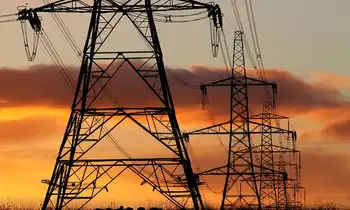Experts predict electricity to be sufficient in summer
By The Blade
Arc Flash Training - CSA Z462 Electrical Safety
Our customized live online or in‑person group training can be delivered to your staff at your location.

- Live Online
- 6 hours Instructor-led
- Group Training Available
That is in part because of added standby power plants, or small plants fueled by natural gas that produce electricity during times of peak use.
Such electricity generation is expensive, however, and that will cost utilities needing it.
But FirstEnergy Corp., which owns Toledo Edison, has a locked-in rate for the next 3 1/2 years, so higher costs shouldn't show up on consumer bills.
Having enough power in the summer is especially dear to the hearts of Midwesterners who remember the great blackout of August, 2003, when instability on FirstEnergy's lines created a power failure that quickly spread to eight states.
Peak demand for electricity in the Midwest is expected to be up 9 percent from last year and nationwide is expected to be 6 percent higher, to 819,500 megawatts, according to the North American Electric Reliability Council.
The council, in New Jersey, is funded by the electricity industry to oversee the nation's power grid.
During the hottest times this summer, the council's Midwest affiliate estimated, 104,000 megawatts will be used to power air conditioners and other equipment for 40 million people.
Officials at the national reliability council asked FirstEnergy this year to install by Wednesday more than three dozen devices throughout its Ohio and Pennsylvania service territories that would automatically cut power to some customers to prevent another widespread blackout.
The utility will not say exactly where the devices are or which customers would be affected, but cuts would include homes as well as businesses.
The devices could cut about 1,300 megawatts of power. One megawatt powers roughly 500 homes.
"We would have a small outage as opposed to a big one," said FirstEnergy spokesman Ellen Raines.
"These are a last resort and we hope we never have to use them."
The utility was faulted by national investigators of the 2003 blackout for not having a working system to recognize the spreading outage and isolate it before it created the biggest blackout in the country's history.
The cost of the devices is part of the estimated $1 billion the utility will spend this year on capital improvements, operations, and maintenance to try to boost its system's reliability.
James Halloran, an energy analyst with NatCity Investments in Cleveland, said he is confident about the summer.
"The Midwest is not really a major problem," he said.
"There's a reasonably decent reserve capacity. In the last 40 years, I've seen three blackouts, and one didn't even occur in hot weather."
PJM Interconnection, a Valley Forge, Pa., firm that manages the grid in all or part of Ohio, Michigan, and 11 other states, said this week it expects to have sufficient generating capacity to meet projected use this summer.
The Farmer's Almanac predicts that conditions this summer in Ohio, part of Michigan, and surrounding states will be warm and wet.











